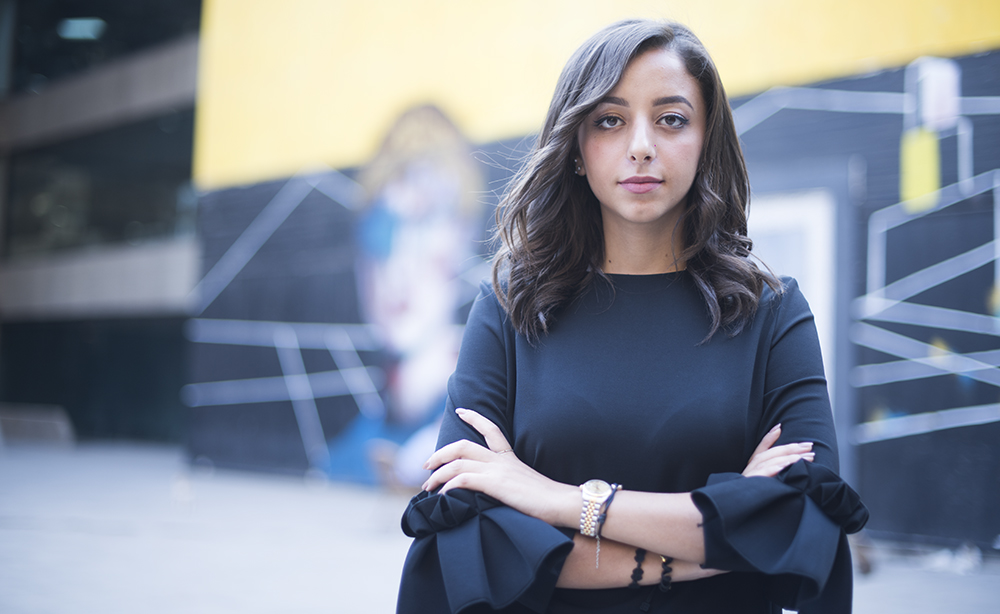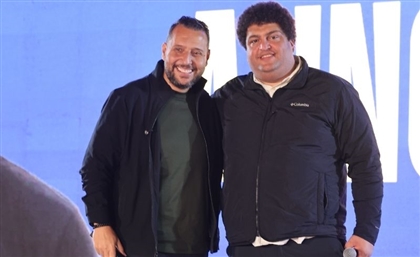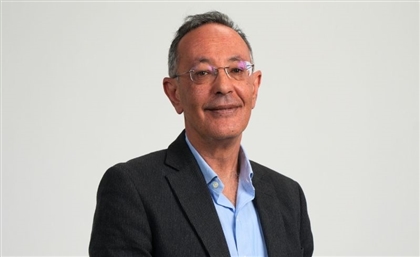22 Questions with RiseUp’s 22-Year-Old New Manager, Dalia Kamar
In 2 years, this young, unwavering woman went from being an intern to managing the Middle East’s most world-shattering event - all while graduating from college at the same time.

It's that time of the year again; that time when Cairo's downtown tech valley dresses up in yellow to receive the movers and shakers of the creative, the tech, and the entrepreneurial spheres in a three-day marathon of reckless alchemy. For the past five years, the RiseUp Summit has redefined - and moulded - the entrepreneurial scene, not only in Egypt but also the Middle East. And at the helm of it all, a team that does not fear change and transgression stays true to its mission: letting the young, unstoppable, reckless misfits lead the next steps.
Enter Dalia Kamar, a female force that admits no boundaries. Having joined the summit as a 20-year-old student, the young hustler speedily climbed the ladder from intern, to Marketing Manager, to become one of the youngest managers in a startup event - all the while running between university campuses, juggling exams and startup pitches, and closing deals with speakers. "I hadn’t had any work experience when I joined, but I had entered the AUC's Entrepreneurs Society club, which really got me into entrepreneurship," she recalls. "I decided to take three tracks, and applied to RiseUp as an intern, and at the same time applied to be the CEO of ES, and to transfer to a university abroad. I thought 'whatever comes first, I’ll weigh my options.' But in one week, I got all three letters of acceptance. I was at a crossroads between staying or leaving, and I decided to stay because I felt I was just starting to make something meaningful," she says.
Having joined the company in 2015, the young hustler started the marketing department that transitioned into positioning the startup from an event to a company, not just in Egypt but across the Middle East. “My first summit was a race against time. I’d work four times a week, attend classes twice a week, and leave work on Wednesdays early to catch to bus for my 5 o’clock class, while putting in hours into the AUC's Entrepreneurship Society club (ES). It was such a crazy time in my life. I was offered to stay as marketing manager, and that was a whole new challenge, because to balance a full-time study programme, while being the CEO at ES, while working for the summit, which happened at the same time as I was graduating," she recalls.
"Last year, I had an out of body experience, juggling my two thesis projects with the summit," she adds, recalling the event that would change her career path. "I had 18-hour long days. One of my graduation projects was submitted the day after the summit, and while everyone was celebrating and relaxing, I had to go rehearse the presentation, without having slept, and do it all over again. I hadn’t realised I hadn’t slept for 3 days and my body was giving up. But it showed me that I can go beyond what I think are my physical limitations."

"The revolution 2.0 is people doing things for themselves instead of waiting for someone to give them something," she says.
Imbued by the spirit of the revolutionary days, Dalia was only in 10th grade in 2011, but the impact of the January revolt left a mark in her. "It’s interesting to see the contrast of working in this zone, because so much historical change happened here. People had such a negative connotation of this zone after 2011, and as you walk out the summit, it just puts things in perspective that out of every downfall there is hope, and after hope there is more hope. That's the revolution 2.0; it's people doing things for themselves instead of waiting for someone to give them something," she asserts.
One year later, the marketing graduate, formerly known as the intern, would become the event manager, disrupting all structures and defying the very notion of experience. "When I started and would go to meetings with Con [O'Donnell] people would look at me wondering ‘why did he bring this child'? I could see it in their faces," she says, as she points out to the future with optimism. “But the work structures have changed. I think people take the word experience too dramatically; they define it as a number of work hours. They don’t think about what you’ve done to enable them to go beyond what they've expected," she says. "Managers hire employees to do what they want them to do, but leaders hire people to outsmart them." As she narrates her brief but incredibly restless journey to the top of her game, we shake off our curiosity and kick-start our questionnaire.
1. What’s your morning ritual?
Coffee.
2. Your hack to handle pressure?
Football. I’ve been playing for 11 years, and I now play for thek Maadi women’s team.
3. What’s the worst thing you’ve heard sitting on a board with managers?
“What does she even know?” while they were talking about someone my age.
4. What’s your typical white lie?
I’m in a meeting. But 99% of the time it’s true.
5. What’s the best part about being a young manager?
You don’t really have anything to lose, cause you are already going against what people think you are capable of.
6. And the worst?
The pressure. I think, beyond the pressure of what I have to do everyday, being a woman who is 22, is extremely pressuring.
7. What’s your pet peeve?
Grammar and proper email writing. What ever happened to a proper email?
8. Describe your strengths in 3 words.
Resourceful (I’m really scrappy); I’d also say I’m pretty creative on the spot and quick on my feet, and I’m trustworthy. I think - I hope - I give off an impression where people see something in me that says when I promise something I’ll get it done.

"I try to say that you never really know what your potential is until you feel like you reach something and say ‘wait, I can do much more.’"
9. Your potential, in a catchphrase?
I try not to think about it, because I try not to limit myself. I try to say that you never really know what your potential is until you feel like you reach something and say ‘wait, I can do much more.’ I don’t really think you can ever reach your true potential.
10. What do you suck at?
Balancing my strengths. I’m getting better at having this work balance, but I’m not really good at dealing with stress, and I think that’s something that comes with being young. I still need to work on my face game.
11. What superpower would you like to have?
Stopping time, for sure, so that we can have an extra year to plan the summit, and to enjoy the moments, because you don’t really get to enjoy them.
12. What’s your favourite RiseUp moment?
The scariest moment, when it’s 8.30 AM and there is nothing more we can do, and we open the gates. It’s just a make it or break it moment. It’s the most bittersweet moment, because you are thinking ‘I’ve done everything I could, get them in’ and you are also thinking ‘wow, all these people are coming in’ and at the same time ‘shit, what now?’
13. One person that inspires you?
My mom. I know it sounds cliché, but she is the reason I see so much in myself, because she is a superwoman. She is the example of how to find strength within you and how to be independent. She has never taken my hand to anything.
14. What’s the stereotype you hate the most about being a female manager?
That I am bitchy for expecting things. The worst thing is that I am trying not to come down on you every single day - we have a very informal working environment, but when I am direct, I am seen as being stuck up, and I feel like if I was a man I would be seen as being stern.
15. What was your defining moment at RiseUp?
We were in a team meeting a couple of months ago, and it was very normal to look for Con or Abood to talk. That day, Con introduced me as the CEO of the summit, I just saw everyone’s face turn to me to guide them, and it was one second that was super defining. It was like he was giving me the torch. So I love it when people come to me for advice now because I remember being that person that went to them for help before, so it’s a full circle.
16. If you could be anything else in the world, what would you be?
I think if I could be anything, I would be content. I hope wherever I am I can content.
17. What are you grateful for today?
I’m grateful that I am sitting with you and reflecting on my life, because this just puts things in perspective. I feel like finally this is the result of all the days and nights I didn’t sleep for this.
18. What’s the unspoken rule of the Egyptian ecosystem?
Never try to define who is the godfather of the ecosystem, or who is actually doing something and who isn’t. Never try to put people in their place, because it leaves a bitter taste in people’s mind. A lot of people say ‘this accelerator, or this investor does this or that’ and that’s not really how the ecosystem works.
19. Dead or alive, who would you dream of bringing to the summit?
I guess it would be Steve Jobs, or Mark Zuckerberg, or Jack Ma, because they are prime examples of what we are doing here. People think of them as huge companies, but they don’t realise they didn’t start off like that. They’ve built this, they are the reason we are here.
20. Word association: What comes to your mind when you think of challenge?
Opportunity.
21. Home?
Sleep.
22. Middle East?
More than breaking news.
Photos by @MO4Network's #MO4Productions.
Photographer: Mido Reda.
- Previous Article Bassita: Click Funding for a Better Egypt
- Next Article Egyptian Delivery Startup VOO Closes Investment Deal With Alex Angels






















